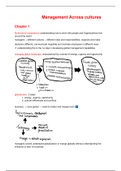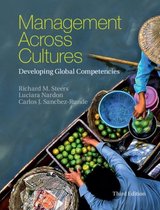Management Across cultures
Chapter 1
Multicultural competence understanding how to work with people and Organizations from
around the world
managers → different cultures → different roles and responsibilities, organize and make
decisions different, communicate negotiate and motivate employees in different ways
↗️ understanding this is the 1e step in developing global management capabilities
changing global landscape: characterized by a sense of energy, urgency and opportunity
globalization: 2 sides
1. energy, urgency, opportunity
2. cultural differences and conflicts
business → more global → need for better and cheaper tech
managers cannot understand globalization or mange globally without understanding the
influence of tech on business
,magnitude of globalization and its impact → interconnectedness ← changes positive/negative
impact : globalization → interconnectedness → consequences
bicultural → multicultural or global environment → 3 challenges:
1. no dominant culture: to which culture should you adapt to
2. multicultural encounters on a short notice → little time to learn
3. multicultural meetings occur virtually
old ways of doing business: communicating, negotiating, leading, and doing business ← less
effective
challenge = globalization pressure → direct influence on:-quality
- effectiveness of management
challenge for managers: outperform competitors individually/collectively ← achieved by
focusing on: -one's own self interest
-building mutually beneficial strategic alliances with global partners
nation states and multinational corporations will remain both powerful and important not
moving to a borderless society. Global networks, comprising tech, entrepreneurial, social
welfare, and environmental interest groups, will also remain powerful. Global network =
power
economic, business, political, social, and environmental endeavors → characterized by a
search for common ground, productive partnerships and mutual benefits.
managers are responsible for utilizing human, financial, informational and physical resources
in ways that facilitate their organization's overall objectives
multicultural competence Cultural intelligence, global leadership: the ability of managers to
develop a perspective that stretch beyond domestic border ← question of how much a
manager possess it/to what degree/level of competence ← important tool to guide social
interactions, business decisions.
,to meet the challenges → hard work, clear thinking, serious Reflection and attentive behavior
different cultures have different assumptions, behaviors, communication styles and
expectations . about management practice
Multicultural competence is the ability to deal with these differences
multicultural competence = getting things done through people by capitalizing on cultural
diversity ← can be seen as a way of viewing the world with a particular emphasize on
broadening one's cultural perspective as it relates to cross cultural behavior.
multicultural competence = includes elements of curiosity, awareness of diversity, and
acceptance of complexity.
Possessing multicultural competence have commitment to diversity, consciousness and
sensitivity as well as valuing diversity itself. focus on continues improvement with a capacity
of self-improvement and helping others develop. → long-term perspective on activities and
plans, focus on long-term results. take a systems perspective including an ability to seek out
interdependencies and cause-effect relationships
, stage 2: to visualize 3 interrelated environments: cultural, organizational and situational ←
managers must suceed in all 3 simultaneously
stage 3: global managerial skills = cross-cultural communication, leadership, negotiation and
global partnerships, ethics, work and motivation. team management, and living and working
successfully abroad.
Chapter 2
Understanding cultures → more difficult due to increasing speed business occurs → Key
factor is Recent technological advancements ← communication and information technology
← make it possible to compete from anywhere
management = the coordination and control of people
material and processes in order to achieve specific organizational objectives
as efficiently and effectively as possible ← central pillar of organized society
thoughts to form central pillar of organized society:
Frederick Taylor → emphasized production or operations management and the necessity to
structure jobs, people, and incentive systems in ways that maximize performance
Henri Fayol → emphasized the importance of standardized "principles" of management, in
division of work, unity of command, unity of direction, and the subordination of individual
interest to the general (organizations) interest.
Organizations must be managed through Strength, discipline, hierarchy, and logic
Weber—. Bureaucracy= rules governed everything ad little was left to chance. People hired
and promoted based on qualifications. Power and authorities vested in offices not individuals
Mintzberg —> all mangers serve 10 basic managerial roles: figurehead, leader, liaison,
monitor, dissemination, spokesperson, entrepreneur, disturbance handler, resource
allocator, negotiator. <— can be cluster into: interpersonal, informational, decisions.
Conceptions of business management and application of management principles <—
combination of cultural backgrounds, personal experiences and the situations confronting
them.






